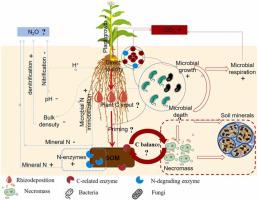Journal of Hazardous Materials ( IF 13.6 ) Pub Date : 2022-09-24 , DOI: 10.1016/j.jhazmat.2022.130055 Jie Zhou 1 , Rong Jia 1 , Robert W Brown 2 , Yadong Yang 1 , Zhaohai Zeng 1 , Davey L Jones 3 , Huadong Zang 1

|
Biodegradable mulch film potentially offers an encouraging alternative to conventional (petroleum-based) plastic films. Since biodegradable films are more susceptible to rapid degradation and more microplastics (MPs) might be generated than conventional films within the same time frame, probably leading to more severe MPs pollution and associated effects. However, the effect of biodegradable mulch film residues and associated MPs pollution on plant-soil health remains uncertainty. Here, we discussed the potential effect of bio-MPs pollution on soil carbon (C) and nutrient (i.e., N and P) cycling, soil biology (microorganisms and mesofauna), and plant health, as these are crucial to agroecosystem function and the delivery of key ecosystem services. Unlike the inert (and therefore recalcitrant) C contained within petroleum-based MPs, at least 80% of the C from bio-MPs is converted to CO2, with up to 20% immobilized in living microbial biomass (i.e., < 0.05 t C ha-1). Although biodegradable films are unlikely to be important in promoting soil C storage, this may accelerate microbial biomass turnover in the short term, as well as CO2 production. Compared to conventional MPs, bio-MPs degradation is more pronounced, thereby indicating greater alterations in microbial diversity and community composition. This may further alter N2O and CH4 emissions, and ultimately resulting in unpredictable consequences for global climate warming. The extent to which this may occur, however, has yet to be shown in either laboratory or field studies. In addition, bio-MPs have a large chance of forming nanoplastics, potentially causing a stronger toxic effect on plants relative to conventional MPs. This consequently would influence plant health, crop productivity, and food safety, causing potential health risks. It is unclear, however, if these are direct effects on key plant processes (e.g. signaling, cell expansion) or indirect effects (e.g. nutrient deficiency or acidification). Overall, the question as to whether biodegradable mulch films offer a promising alternative to solve the conventional plastic legacy in soil over the long term remains unclear.
中文翻译:

可生物降解地膜残留物和相关微塑料污染对植物土壤健康的长期不确定性
可生物降解的地膜可能为传统(石油基)塑料薄膜提供令人鼓舞的替代品。由于可生物降解薄膜更容易快速降解,并且在同一时间范围内可能会产生比传统薄膜更多的微塑料 (MPs),这可能导致更严重的 MPs 污染和相关影响。然而,可生物降解的地膜残留物和相关的 MPs 污染对植物土壤健康的影响仍然不确定。在这里,我们讨论了生物 MPs 污染对土壤碳(C)和养分(即 N 和 P)循环、土壤生物学(微生物和中型动物)和植物健康的潜在影响,因为这些对农业生态系统功能和提供关键的生态系统服务。与石油基 MP 中所含的惰性(因此是顽固的)C 不同,2,高达20% 固定在活的微生物生物质中(即,< 0.05 t C ha -1)。尽管可生物降解薄膜在促进土壤碳储存方面不太可能发挥重要作用,但这可能会在短期内加速微生物生物量的周转以及 CO 2的产生。与传统 MPs 相比,bio-MPs 降解更为明显,从而表明微生物多样性和群落组成发生了更大的变化。这可能会进一步改变 N 2 O 和 CH 4排放,并最终对全球气候变暖造成不可预测的后果。然而,这可能发生的程度尚未在实验室或现场研究中显示。此外,生物 MPs 有很大的机会形成纳米塑料,相对于传统 MPs,可能对植物产生更强的毒性作用。因此,这将影响植物健康、作物生产力和食品安全,造成潜在的健康风险。然而,尚不清楚这些是对关键植物过程的直接影响(例如信号传导、细胞扩增)还是间接影响(例如营养缺乏或酸化)。总体而言,关于可生物降解的地膜是否为长期解决土壤中传统塑料遗留问题提供了一种有希望的替代方案的问题仍不清楚。


























 京公网安备 11010802027423号
京公网安备 11010802027423号